“Even a couple of years ago I’d never have imagined we’d build a house in a field, but that’s what we did”
Gareth Marshall is among a growing number of foreigners based in Thailand who have swapped city life in Bangkok for the simple pleasures and empty pastures of Esan, the country’s vast and decidedly rural Northeastern region. Despite obvious challenges and occasional setbacks, the move has proved a great success, with Gareth and his Thai wife Hana building their dream home and working farm in what was once a field with just one tree.
Born in Glasgow, Scotland, 49-year-old Gareth first arrived in Thailand in 1996, working initially in a restaurant on Koh Tao. He then taught English at the British Council, and later edited an English language business magazine. For most of the last 15 years, he’s worked at a public relations agency in Bangkok. His Thai wife Hana is originally from the Northeast city of Kalasin. They first met in Bangkok some 13 years ago.
Born in Glasgow, Scotland, 49-year-old Gareth first arrived in Thailand in 1996, working initially in a restaurant on Koh Tao. He then taught English at the British Council, and later edited an English language business magazine. For most of the last 15 years, he’s worked at a public relations agency in Bangkok. His Thai wife Hana is originally from the Northeast city of Kalasin. They first met in Bangkok some 13 years ago.
“From making our decision to build a house to moving in took less than a year. The house was built in six months”
Q: What brought you to Thailand, and when?
I had no intention of coming to Thailand. I was a young manager at a UK shoe retailer and when a senior manager and I didn’t see eye to eye I left and decided to travel with Indonesia top of my list. That was in ’96. The travel agent suggested a flight to Bangkok would be cheaper and I could work my way to Indonesia over a month. Seven months later I was still here, and within a year of leaving to work in Australia (as a tram conductor – that’s another story), I was back in Thailand.
Q: What keeps you here?
I always felt at home here ever since my first visit - the food, the non-Scottish weather, the lifestyle. Now, because Thailand has been my home for so long, it feels strange to think of living anywhere else. I met great people when I first arrived and that’s continued throughout my time here. In 2009 I met my wife, although we only married in January 2021. A Covid wedding. We were always going to be together, but it felt the right time to make it official. She keeps me here now.
Q: What inspired you to swap big city life for upcountry Thailand?
I guess it was another Covid-influenced decision. About six or seven years ago we bought a strip of land of about seven-rai near my wife’s home village. During Covid, life became quite uncertain, so we thought about how to bring some certainty to our future. We’d talked about living up here in the past but I guess we expected to live in Khon Kaen, or even Kalasin. Even a couple of years ago I’d never have imagined we’d build a house in a field, but that’s what we did.
The decision was initially about having a home and security, and then developed into how we could live here. The appeal of using our land to grow our own food kind of hooked us and despite not having much knowledge or experience of building a house and starting to farm, that’s what we decided to do. For me, I liked the idea of doing something meaningful and learning something completely new.
We were gifted another eight rai of land from my mother-in-law next to the land we bought, and that’s where we built our house. It was a field that alternated between sugar cane and cassava crops, two of the main staples here, so it meant a loss of income for the family. We’ve just built mother-in-law a little house about 80 metres from ours and she’s happy as she just wants to live in the open, rather than in the village. She’s a cracking gardener too so she’s been a huge help.
We’re about a 40-minute drive from Kalasin near a small town called Sahatsakhan. It’s home to the best museum I’ve seen in Thailand, The Sirindhorn Museum, which is a significant dinosaur fossil excavation site.
Q: Why that particular area of Thailand?
It’s my wife’s home and I’ve been coming here since 2010 so I knew the area reasonably well.
I had no intention of coming to Thailand. I was a young manager at a UK shoe retailer and when a senior manager and I didn’t see eye to eye I left and decided to travel with Indonesia top of my list. That was in ’96. The travel agent suggested a flight to Bangkok would be cheaper and I could work my way to Indonesia over a month. Seven months later I was still here, and within a year of leaving to work in Australia (as a tram conductor – that’s another story), I was back in Thailand.
Q: What keeps you here?
I always felt at home here ever since my first visit - the food, the non-Scottish weather, the lifestyle. Now, because Thailand has been my home for so long, it feels strange to think of living anywhere else. I met great people when I first arrived and that’s continued throughout my time here. In 2009 I met my wife, although we only married in January 2021. A Covid wedding. We were always going to be together, but it felt the right time to make it official. She keeps me here now.
Q: What inspired you to swap big city life for upcountry Thailand?
I guess it was another Covid-influenced decision. About six or seven years ago we bought a strip of land of about seven-rai near my wife’s home village. During Covid, life became quite uncertain, so we thought about how to bring some certainty to our future. We’d talked about living up here in the past but I guess we expected to live in Khon Kaen, or even Kalasin. Even a couple of years ago I’d never have imagined we’d build a house in a field, but that’s what we did.
The decision was initially about having a home and security, and then developed into how we could live here. The appeal of using our land to grow our own food kind of hooked us and despite not having much knowledge or experience of building a house and starting to farm, that’s what we decided to do. For me, I liked the idea of doing something meaningful and learning something completely new.
We were gifted another eight rai of land from my mother-in-law next to the land we bought, and that’s where we built our house. It was a field that alternated between sugar cane and cassava crops, two of the main staples here, so it meant a loss of income for the family. We’ve just built mother-in-law a little house about 80 metres from ours and she’s happy as she just wants to live in the open, rather than in the village. She’s a cracking gardener too so she’s been a huge help.
We’re about a 40-minute drive from Kalasin near a small town called Sahatsakhan. It’s home to the best museum I’ve seen in Thailand, The Sirindhorn Museum, which is a significant dinosaur fossil excavation site.
Q: Why that particular area of Thailand?
It’s my wife’s home and I’ve been coming here since 2010 so I knew the area reasonably well.
“People here work hard here to earn very little. It’s about time Thailand valued its farmers better rather than pushing them into a horrible cycle of debt”
Q: What was the reaction of your family back in Scotland?
My grandfather was a farmer and my mum and aunts and uncles were brought up on a farm, so I think they liked the idea after the initial shock. I think they are just waiting for the green light to come out and see the place for themselves now.
Q: How’s it working out?
Love it. We live in a house that we designed, we are out in the open every day, and we eat fresh food that comes from our land - and our efforts. Every morning I’m out at 6am to take the dog for a walk for an hour or so while Hana potters about in the garden.
Despite being out in the country we have a really good internet connection which means we can work as well as watch movies and sport or whatever we want to watch on TV. If I’d moved here in ’96 when I first arrived in Thailand none of that would have been possible.
We have a lot of land to work and we’re developing that stage by stage. Up until recently we’ve really just had a big garden, but in April we got the digger in and we’re starting to think bigger. We don’t have any concrete plans yet but I want to put as much of the land to use as possible. We’ve dug ponds so we might stock some fish. We’ve planted a few hundred fruit trees and after rainy season we’ll plant more vegetables. And of course we have some rice fields. We eat well!
Q: How did you go about building your own house in unfamiliar surroundings?
We found a small company in Nakhon Nayok that started out as a known-down house builder, but after the son studied architecture they started getting more creative and ambitious. We spoke to them about our ideas, then worked with them to fine tune the design. They managed to get pretty much what we asked for once we knew what we could get within our budget.
As well as designing, their team also took care of the build, so it kept everything pretty simple. A price was agreed on before we built, and that’s the price we paid. That included house build, water system, electricity in the house, bathroom fittings and painting and decorating.
Building in a field we had to dig our own well for water, and we’ve had no problem with that, and recently moved to using a solar-powered pump as we need to water the land too. And we ran electric lines from the nearest village.
From making our decision to build a house to moving in took less than a year. The house was built in six months.
Q: How have your near neighbours and other locals taken to a ‘farang’ in their midst?
The people around us are great. I get a few nervous looks during my morning walks but usually it’s just shock. I speak enough Thai to be able to start a conversation and that makes things easier.
We’ve had loads of help on the land too. Usually we come up with ideas and get a few people round to tell them our plans for the land and see what they say. I think they like what we are trying to do, so it’s easier for them to support.
Asking their advice makes a big difference too as it shows we respect their knowledge and helps us build a relationship with them. Drinking a shot or two of ‘Lao Kao’ also helps get to know each other!
Q: What has been the biggest? challenge setting up a home in Esan?
Not being able to speak Esan. That’s it, really. My wife’s life would be a lot easier if I could communicate freely with everyone, so she spends a lot of time as a language and cultural translator. She has a tough job.
Q: How have you handled the local bureaucracy –and visas?
Perhaps the biggest surprise is how easy everything has been. I go to immigration and most times I’m the only one there. I renewed my driving license in about 15 minutes - I was given an appointment three months away when I was in Bangkok.
Immigration even came to visit our house to make sure I really lived here and we spent an hour talking about how the house was built and what we were planting. It’s a bit different from Chaeng Wattana.
Q: How do you occupy your time?
Monday to Friday I work. I’ve set up a little office area and everyone leaves me alone to take Zoom calls, write press releases or do whatever else I need to do. It’s dark by 6.30 and when I say dark, I mean pitch black. The nearest village is a few kilometres away and we see their lights, but that’s it. Full moon skies are stunning though.
At the weekends it’s often figuring out what to do with the land, working on the land or improving the house, or just enjoying the breeze. Internet is better than I expected so usually a Saturday night is spent watching football or a movie.
There are a lot of other foreigners here but the distances are big. Some areas seem to be quite popular and have a bit of a foreign community.
Q: How far is the nearest pub, 7/11 and shopping centre?
The nearest BIG shopping centre would be Central in Khon Kaen – two hours away. 7/11 is about 10-15 minute drive, but there are closer mom and pop shops in the villages.
Pub is harder. Probably Kalasin. Haven’t been to one yet as I’d have to drive, and to be honest we have a cracking balcony and a cold fridge so that tends to work for me.
Q: How and where you buy essentials, including food?
Probably the same place everyone else buys them -. Tesco, Big C, Makro. They are all within easy distance. Recently a lot of vegetables come from the garden.
Q: What do you miss most about Bangkok life?
Just asked Hana, my wife, and she said nothing, and I’d tend to agree. It might be more accurate to say what I don’t miss. Traffic jams are not really a thing up here and because there’s less traffic there are less ‘incidents’ on the road. There are still people who overtake when they shouldn’t, but mostly the roads are ok, although I avoid driving at night.
If we miss anything it’s probably the spontaneity. We’re quite remote so you deciding to pop out to a restaurant takes time, and you’re never quite sure if it’s open, but that usually prompts you to find somewhere new.
Q: How often do you visit Bangkok, or any other part of Thailand?
I visit Bangkok at least once every month to go into the office for a week. It’s a two-hour drive to Khon Kaen, followed by an hour’s flight to Bangkok, although from door to door it’s usually about a five to six-hour journey. Driving takes seven to eight hours.
Q: As a keen footballer, have you considered joining a local team?
I played with the Bangkok Angels, a vets team, for many years and I do miss that, but the start of lockdown in Bangkok put an end to my regular football with them. I haven’t found a team up here yet.
Q: What advice would you give to a ‘farang’ thinking of doing what you’ve done?
Be prepared for things to go wrong and be flexible with your plans. It’s not going to be the same as wherever you are from, but surely that’s the point of being in Thailand, right?
I think listening to local advice about your house or your land is important. You might not follow the advice but listening will win friends - sometimes you’ll be right to do your own thing, sometimes you won’t. There’s a lot of knowledge about how the land and the weather works out in the country, and while people may not be academically blessed their knowledge of how to overcome some of the setbacks nature places in front of you is quite amazing. It’s worth giving locals that respect as their knowledge and experience may help you one day.
My grandfather was a farmer and my mum and aunts and uncles were brought up on a farm, so I think they liked the idea after the initial shock. I think they are just waiting for the green light to come out and see the place for themselves now.
Q: How’s it working out?
Love it. We live in a house that we designed, we are out in the open every day, and we eat fresh food that comes from our land - and our efforts. Every morning I’m out at 6am to take the dog for a walk for an hour or so while Hana potters about in the garden.
Despite being out in the country we have a really good internet connection which means we can work as well as watch movies and sport or whatever we want to watch on TV. If I’d moved here in ’96 when I first arrived in Thailand none of that would have been possible.
We have a lot of land to work and we’re developing that stage by stage. Up until recently we’ve really just had a big garden, but in April we got the digger in and we’re starting to think bigger. We don’t have any concrete plans yet but I want to put as much of the land to use as possible. We’ve dug ponds so we might stock some fish. We’ve planted a few hundred fruit trees and after rainy season we’ll plant more vegetables. And of course we have some rice fields. We eat well!
Q: How did you go about building your own house in unfamiliar surroundings?
We found a small company in Nakhon Nayok that started out as a known-down house builder, but after the son studied architecture they started getting more creative and ambitious. We spoke to them about our ideas, then worked with them to fine tune the design. They managed to get pretty much what we asked for once we knew what we could get within our budget.
As well as designing, their team also took care of the build, so it kept everything pretty simple. A price was agreed on before we built, and that’s the price we paid. That included house build, water system, electricity in the house, bathroom fittings and painting and decorating.
Building in a field we had to dig our own well for water, and we’ve had no problem with that, and recently moved to using a solar-powered pump as we need to water the land too. And we ran electric lines from the nearest village.
From making our decision to build a house to moving in took less than a year. The house was built in six months.
Q: How have your near neighbours and other locals taken to a ‘farang’ in their midst?
The people around us are great. I get a few nervous looks during my morning walks but usually it’s just shock. I speak enough Thai to be able to start a conversation and that makes things easier.
We’ve had loads of help on the land too. Usually we come up with ideas and get a few people round to tell them our plans for the land and see what they say. I think they like what we are trying to do, so it’s easier for them to support.
Asking their advice makes a big difference too as it shows we respect their knowledge and helps us build a relationship with them. Drinking a shot or two of ‘Lao Kao’ also helps get to know each other!
Q: What has been the biggest? challenge setting up a home in Esan?
Not being able to speak Esan. That’s it, really. My wife’s life would be a lot easier if I could communicate freely with everyone, so she spends a lot of time as a language and cultural translator. She has a tough job.
Q: How have you handled the local bureaucracy –and visas?
Perhaps the biggest surprise is how easy everything has been. I go to immigration and most times I’m the only one there. I renewed my driving license in about 15 minutes - I was given an appointment three months away when I was in Bangkok.
Immigration even came to visit our house to make sure I really lived here and we spent an hour talking about how the house was built and what we were planting. It’s a bit different from Chaeng Wattana.
Q: How do you occupy your time?
Monday to Friday I work. I’ve set up a little office area and everyone leaves me alone to take Zoom calls, write press releases or do whatever else I need to do. It’s dark by 6.30 and when I say dark, I mean pitch black. The nearest village is a few kilometres away and we see their lights, but that’s it. Full moon skies are stunning though.
At the weekends it’s often figuring out what to do with the land, working on the land or improving the house, or just enjoying the breeze. Internet is better than I expected so usually a Saturday night is spent watching football or a movie.
There are a lot of other foreigners here but the distances are big. Some areas seem to be quite popular and have a bit of a foreign community.
Q: How far is the nearest pub, 7/11 and shopping centre?
The nearest BIG shopping centre would be Central in Khon Kaen – two hours away. 7/11 is about 10-15 minute drive, but there are closer mom and pop shops in the villages.
Pub is harder. Probably Kalasin. Haven’t been to one yet as I’d have to drive, and to be honest we have a cracking balcony and a cold fridge so that tends to work for me.
Q: How and where you buy essentials, including food?
Probably the same place everyone else buys them -. Tesco, Big C, Makro. They are all within easy distance. Recently a lot of vegetables come from the garden.
Q: What do you miss most about Bangkok life?
Just asked Hana, my wife, and she said nothing, and I’d tend to agree. It might be more accurate to say what I don’t miss. Traffic jams are not really a thing up here and because there’s less traffic there are less ‘incidents’ on the road. There are still people who overtake when they shouldn’t, but mostly the roads are ok, although I avoid driving at night.
If we miss anything it’s probably the spontaneity. We’re quite remote so you deciding to pop out to a restaurant takes time, and you’re never quite sure if it’s open, but that usually prompts you to find somewhere new.
Q: How often do you visit Bangkok, or any other part of Thailand?
I visit Bangkok at least once every month to go into the office for a week. It’s a two-hour drive to Khon Kaen, followed by an hour’s flight to Bangkok, although from door to door it’s usually about a five to six-hour journey. Driving takes seven to eight hours.
Q: As a keen footballer, have you considered joining a local team?
I played with the Bangkok Angels, a vets team, for many years and I do miss that, but the start of lockdown in Bangkok put an end to my regular football with them. I haven’t found a team up here yet.
Q: What advice would you give to a ‘farang’ thinking of doing what you’ve done?
Be prepared for things to go wrong and be flexible with your plans. It’s not going to be the same as wherever you are from, but surely that’s the point of being in Thailand, right?
I think listening to local advice about your house or your land is important. You might not follow the advice but listening will win friends - sometimes you’ll be right to do your own thing, sometimes you won’t. There’s a lot of knowledge about how the land and the weather works out in the country, and while people may not be academically blessed their knowledge of how to overcome some of the setbacks nature places in front of you is quite amazing. It’s worth giving locals that respect as their knowledge and experience may help you one day.
Q: How have your near neighbours and other locals taken to a ‘farang’ in their midst?
The people around us are great. I get a few nervous looks during my morning walks but usually it’s just shock. I speak enough Thai to be able to start a conversation and that makes things easier.
We’ve had loads of help on the land too. Usually we come up with ideas and get a few people round to tell them our plans for the land and see what they say. I think they like what we are trying to do, so it’s easier for them to support.
Asking their advice makes a big difference too as it shows we respect their knowledge and helps us build a relationship with them. Drinking a shot or two of ‘Lao Kao’ also helps get to know each other!
Q: What has been the biggest? challenge setting up a home in Esan?
Not being able to speak Esan. That’s it, really. My wife’s life would be a lot easier if I could communicate freely with everyone, so she spends a lot of time as a language and cultural translator. She has a tough job.
Q: How have you handled the local bureaucracy –and visas?
Perhaps the biggest surprise is how easy everything has been. I go to immigration and most times I’m the only one there. I renewed my driving license in about 15 minutes - I was given an appointment three months away when I was in Bangkok.
Immigration even came to visit our house to make sure I really lived here and we spent an hour talking about how the house was built and what we were planting. It’s a bit different from Chaeng Wattana.
Q: How do you occupy your time?
Monday to Friday I work. I’ve set up a little office area and everyone leaves me alone to take Zoom calls, write press releases or do whatever else I need to do. It’s dark by 6.30 and when I say dark, I mean pitch black. The nearest village is a few kilometres away and we see their lights, but that’s it. Full moon skies are stunning though.
At the weekends it’s often figuring out what to do with the land, working on the land or improving the house, or just enjoying the breeze. Internet is better than I expected so usually a Saturday night is spent watching football or a movie.
There are a lot of other foreigners here but the distances are big. Some areas seem to be quite popular and have a bit of a foreign community.
Q: How far is the nearest pub, 7/11 and shopping centre?
The nearest BIG shopping centre would be Central in Khon Kaen – two hours away. 7/11 is about 10-15 minute drive, but there are closer mom and pop shops in the villages.
Pub is harder. Probably Kalasin. Haven’t been to one yet as I’d have to drive, and to be honest we have a cracking balcony and a cold fridge so that tends to work for me.
Q: How and where you buy essentials, including food?
Probably the same place everyone else buys them -. Tesco, Big C, Makro. They are all within easy distance. Recently a lot of vegetables come from the garden.
Q: What do you miss most about Bangkok life?
Just asked Hana, my wife, and she said nothing, and I’d tend to agree. It might be more accurate to say what I don’t miss. Traffic jams are not really a thing up here and because there’s less traffic there are less ‘incidents’ on the road. There are still people who overtake when they shouldn’t, but mostly the roads are ok, although I avoid driving at night.
If we miss anything it’s probably the spontaneity. We’re quite remote so you deciding to pop out to a restaurant takes time, and you’re never quite sure if it’s open, but that usually prompts you to find somewhere new.
Q: How often do you visit Bangkok, or any other part of Thailand?
I visit Bangkok at least once every month to go into the office for a week. It’s a two-hour drive to Khon Kaen, followed by an hour’s flight to Bangkok, although from door to door it’s usually about a five to six-hour journey. Driving takes seven to eight hours.
Q: As a keen footballer, have you considered joining a local team?
I played with the Bangkok Angels, a vets team, for many years and I do miss that, but the start of lockdown in Bangkok put an end to my regular football with them. I haven’t found a team up here yet.
Q: What advice would you give to a ‘farang’ thinking of doing what you’ve done?
Be prepared for things to go wrong and be flexible with your plans. It’s not going to be the same as wherever you are from, but surely that’s the point of being in Thailand, right?
I think listening to local advice about your house or your land is important. You might not follow the advice but listening will win friends - sometimes you’ll be right to do your own thing, sometimes you won’t. There’s a lot of knowledge about how the land and the weather works out in the country, and while people may not be academically blessed their knowledge of how to overcome some of the setbacks nature places in front of you is quite amazing. It’s worth giving locals that respect as their knowledge and experience may help you one day.
The people around us are great. I get a few nervous looks during my morning walks but usually it’s just shock. I speak enough Thai to be able to start a conversation and that makes things easier.
We’ve had loads of help on the land too. Usually we come up with ideas and get a few people round to tell them our plans for the land and see what they say. I think they like what we are trying to do, so it’s easier for them to support.
Asking their advice makes a big difference too as it shows we respect their knowledge and helps us build a relationship with them. Drinking a shot or two of ‘Lao Kao’ also helps get to know each other!
Q: What has been the biggest? challenge setting up a home in Esan?
Not being able to speak Esan. That’s it, really. My wife’s life would be a lot easier if I could communicate freely with everyone, so she spends a lot of time as a language and cultural translator. She has a tough job.
Q: How have you handled the local bureaucracy –and visas?
Perhaps the biggest surprise is how easy everything has been. I go to immigration and most times I’m the only one there. I renewed my driving license in about 15 minutes - I was given an appointment three months away when I was in Bangkok.
Immigration even came to visit our house to make sure I really lived here and we spent an hour talking about how the house was built and what we were planting. It’s a bit different from Chaeng Wattana.
Q: How do you occupy your time?
Monday to Friday I work. I’ve set up a little office area and everyone leaves me alone to take Zoom calls, write press releases or do whatever else I need to do. It’s dark by 6.30 and when I say dark, I mean pitch black. The nearest village is a few kilometres away and we see their lights, but that’s it. Full moon skies are stunning though.
At the weekends it’s often figuring out what to do with the land, working on the land or improving the house, or just enjoying the breeze. Internet is better than I expected so usually a Saturday night is spent watching football or a movie.
There are a lot of other foreigners here but the distances are big. Some areas seem to be quite popular and have a bit of a foreign community.
Q: How far is the nearest pub, 7/11 and shopping centre?
The nearest BIG shopping centre would be Central in Khon Kaen – two hours away. 7/11 is about 10-15 minute drive, but there are closer mom and pop shops in the villages.
Pub is harder. Probably Kalasin. Haven’t been to one yet as I’d have to drive, and to be honest we have a cracking balcony and a cold fridge so that tends to work for me.
Q: How and where you buy essentials, including food?
Probably the same place everyone else buys them -. Tesco, Big C, Makro. They are all within easy distance. Recently a lot of vegetables come from the garden.
Q: What do you miss most about Bangkok life?
Just asked Hana, my wife, and she said nothing, and I’d tend to agree. It might be more accurate to say what I don’t miss. Traffic jams are not really a thing up here and because there’s less traffic there are less ‘incidents’ on the road. There are still people who overtake when they shouldn’t, but mostly the roads are ok, although I avoid driving at night.
If we miss anything it’s probably the spontaneity. We’re quite remote so you deciding to pop out to a restaurant takes time, and you’re never quite sure if it’s open, but that usually prompts you to find somewhere new.
Q: How often do you visit Bangkok, or any other part of Thailand?
I visit Bangkok at least once every month to go into the office for a week. It’s a two-hour drive to Khon Kaen, followed by an hour’s flight to Bangkok, although from door to door it’s usually about a five to six-hour journey. Driving takes seven to eight hours.
Q: As a keen footballer, have you considered joining a local team?
I played with the Bangkok Angels, a vets team, for many years and I do miss that, but the start of lockdown in Bangkok put an end to my regular football with them. I haven’t found a team up here yet.
Q: What advice would you give to a ‘farang’ thinking of doing what you’ve done?
Be prepared for things to go wrong and be flexible with your plans. It’s not going to be the same as wherever you are from, but surely that’s the point of being in Thailand, right?
I think listening to local advice about your house or your land is important. You might not follow the advice but listening will win friends - sometimes you’ll be right to do your own thing, sometimes you won’t. There’s a lot of knowledge about how the land and the weather works out in the country, and while people may not be academically blessed their knowledge of how to overcome some of the setbacks nature places in front of you is quite amazing. It’s worth giving locals that respect as their knowledge and experience may help you one day.
“I want to put as much of the land to use as possible. We’ve dug ponds so we might stock some fish.
We’ve planted a few hundred fruit trees and after rainy season we’ll plant more vegetables. And of course we have some rice fields. We eat well!”
We’ve planted a few hundred fruit trees and after rainy season we’ll plant more vegetables. And of course we have some rice fields. We eat well!”
Q: What are the biggest myths about Esan? People are lazy. They aren’t.
I’d challenge anyone in Bangkok to work on the land. Growing and harvesting rice is a great example, as is cutting down sugar cane or cassava. The heat is intense but people work from dawn to dusk doing labour-intensive tasks. Lasting 30 minutes is hard, but people go all day.
Outside of harvest and planting time people are always working. If their land is fine, they are helping a neighbour. People work hard here to earn very little. It’s about time Thailand valued its farmers better rather than pushing them into a horrible cycle of debt all the time.
Q: What are your long-term plans?
Simply to develop the land to provide enough food for ourselves and people around us. There’s not really money to be made in farming so it’s more about creating a place where we want to live. That said, there are always opportunities that come around so whether it’s opening a farm shop, selling organic food to Bangkokians or whatever else happens to come our way, we’ll be ready to adapt.
Q: You call your place The One Tree Farm – is there really only one tree?
When we started there was one tree - a single eucalyptus. Since then we’ve planted hundreds of trees and plants, but I wanted a reminder of where we started so that in 10 years we can hopefully look back and see how much we’ve done.
Also, if we do develop anything beyond feeding ourselves it gives our ‘brand’ a good little story!
We’ve written about our move and the challenges of building a house in a field at www.theonetreefarm.com. We’ll keep updating it as the farm progresses, so feel free to subscribe.
We’re also active on Twitter: https://twitter.com/theonetreefarm and Instagram: https://www.instagram.com/onetreefarmkalasin/
I’d challenge anyone in Bangkok to work on the land. Growing and harvesting rice is a great example, as is cutting down sugar cane or cassava. The heat is intense but people work from dawn to dusk doing labour-intensive tasks. Lasting 30 minutes is hard, but people go all day.
Outside of harvest and planting time people are always working. If their land is fine, they are helping a neighbour. People work hard here to earn very little. It’s about time Thailand valued its farmers better rather than pushing them into a horrible cycle of debt all the time.
Q: What are your long-term plans?
Simply to develop the land to provide enough food for ourselves and people around us. There’s not really money to be made in farming so it’s more about creating a place where we want to live. That said, there are always opportunities that come around so whether it’s opening a farm shop, selling organic food to Bangkokians or whatever else happens to come our way, we’ll be ready to adapt.
Q: You call your place The One Tree Farm – is there really only one tree?
When we started there was one tree - a single eucalyptus. Since then we’ve planted hundreds of trees and plants, but I wanted a reminder of where we started so that in 10 years we can hopefully look back and see how much we’ve done.
Also, if we do develop anything beyond feeding ourselves it gives our ‘brand’ a good little story!
We’ve written about our move and the challenges of building a house in a field at www.theonetreefarm.com. We’ll keep updating it as the farm progresses, so feel free to subscribe.
We’re also active on Twitter: https://twitter.com/theonetreefarm and Instagram: https://www.instagram.com/onetreefarmkalasin/

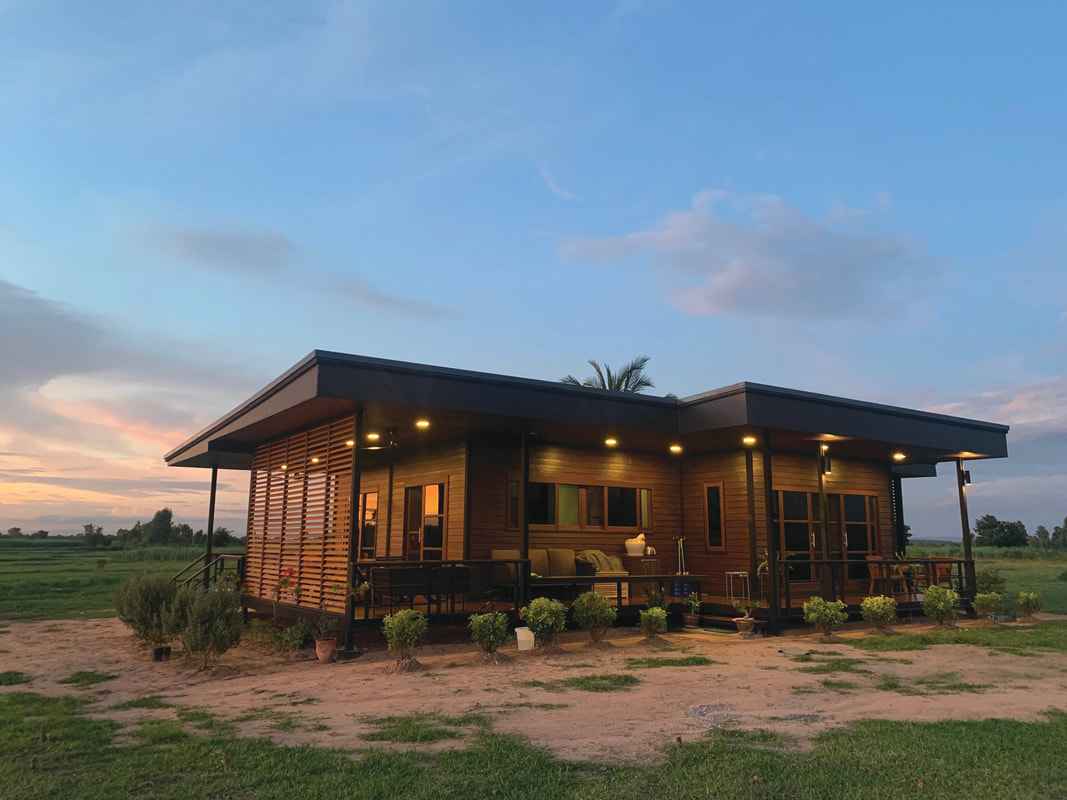
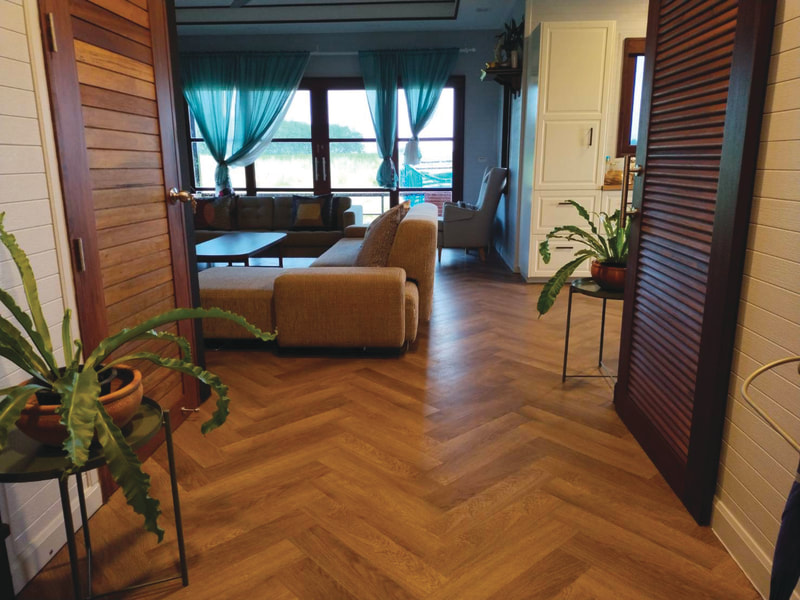

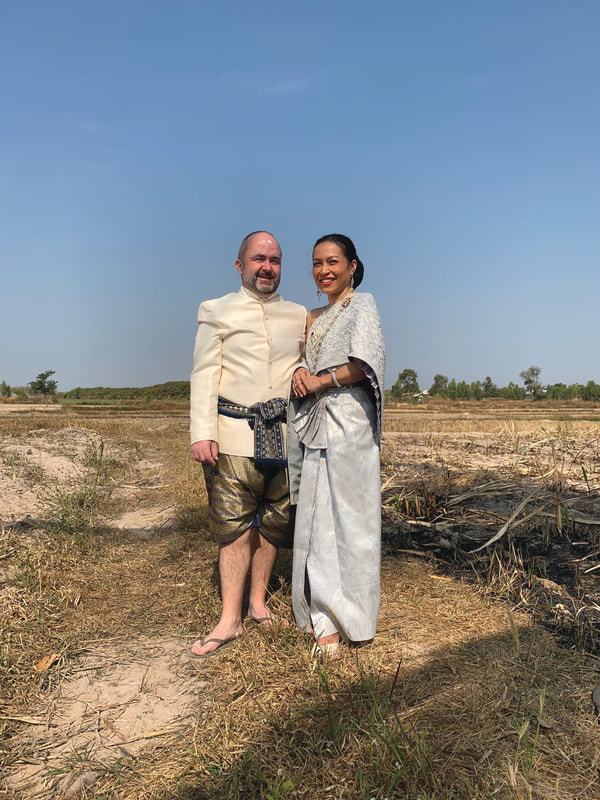
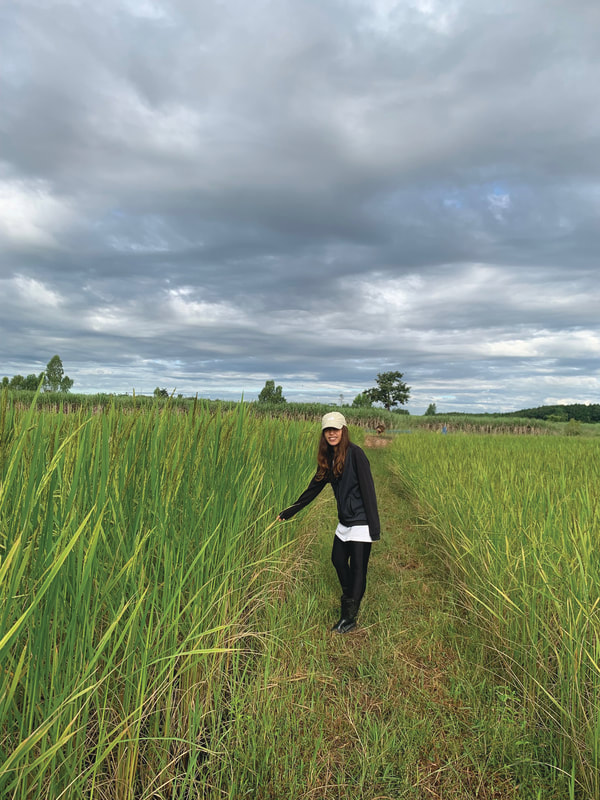
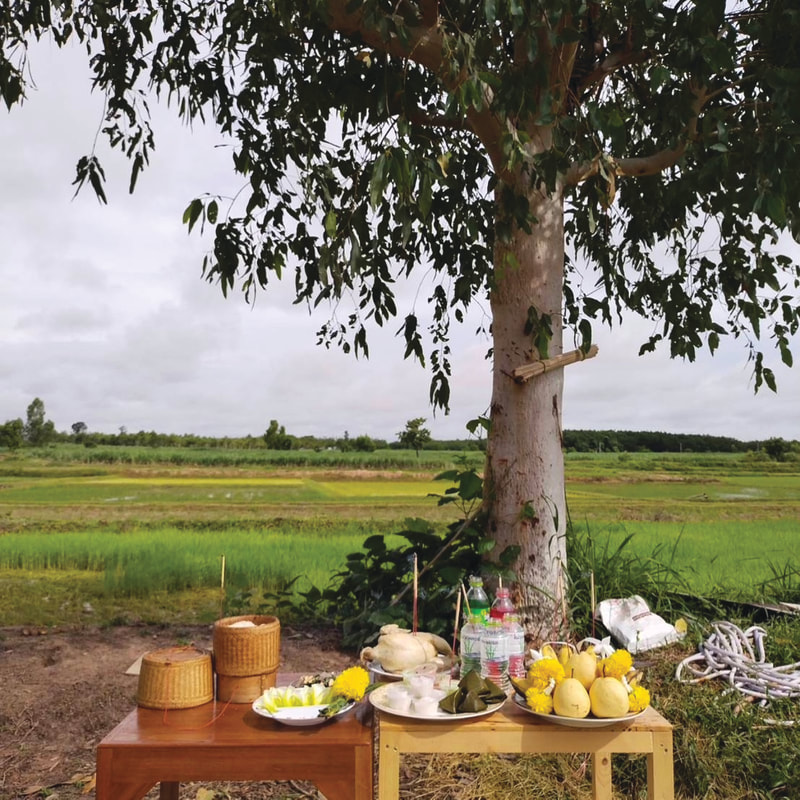
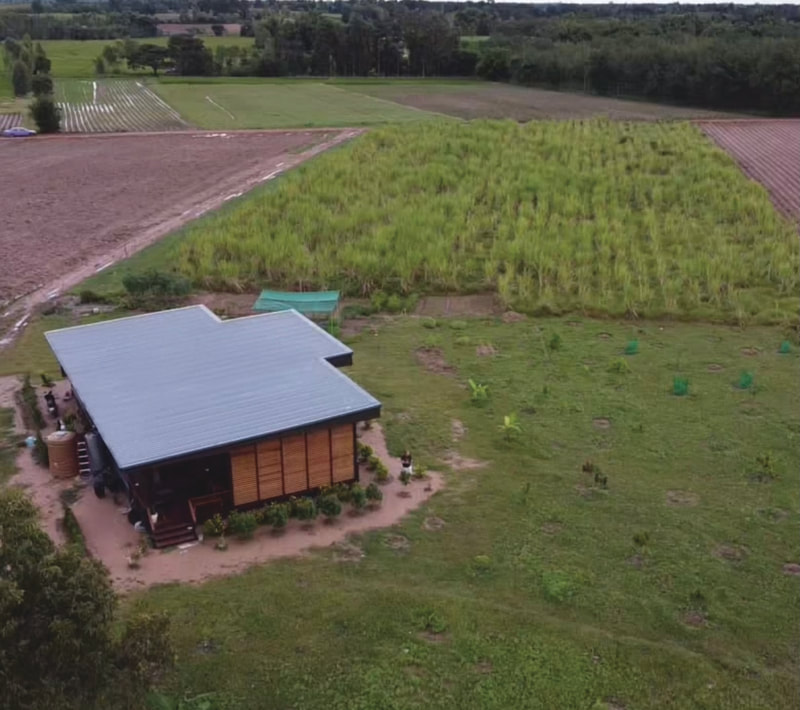
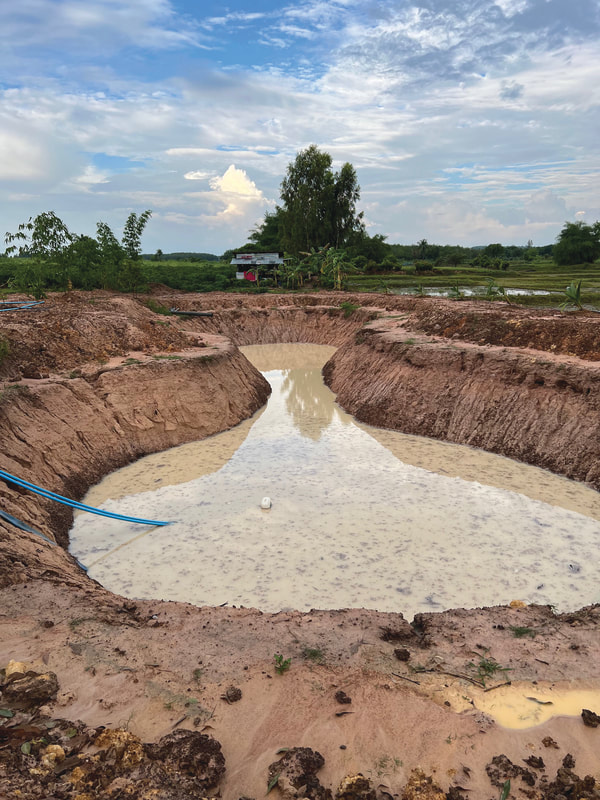
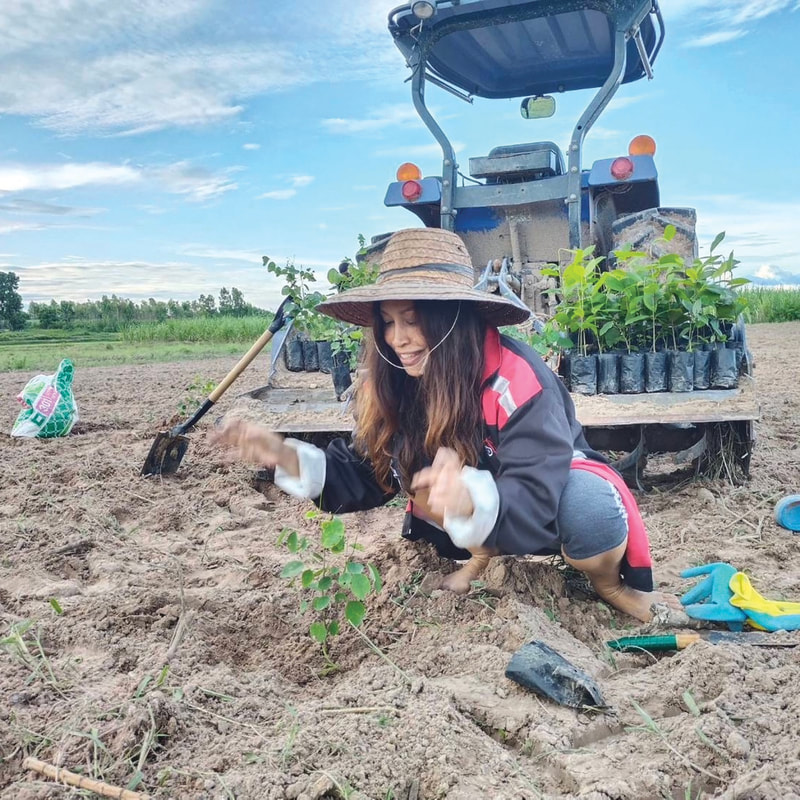
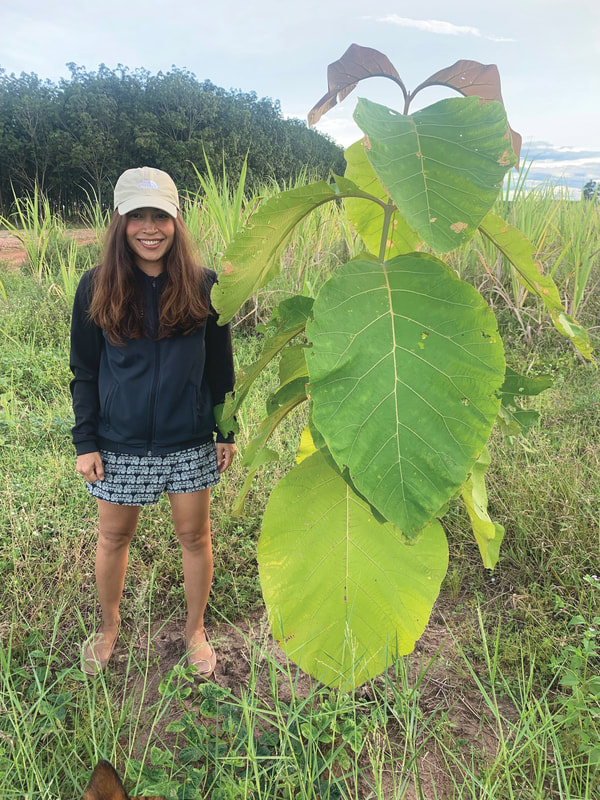
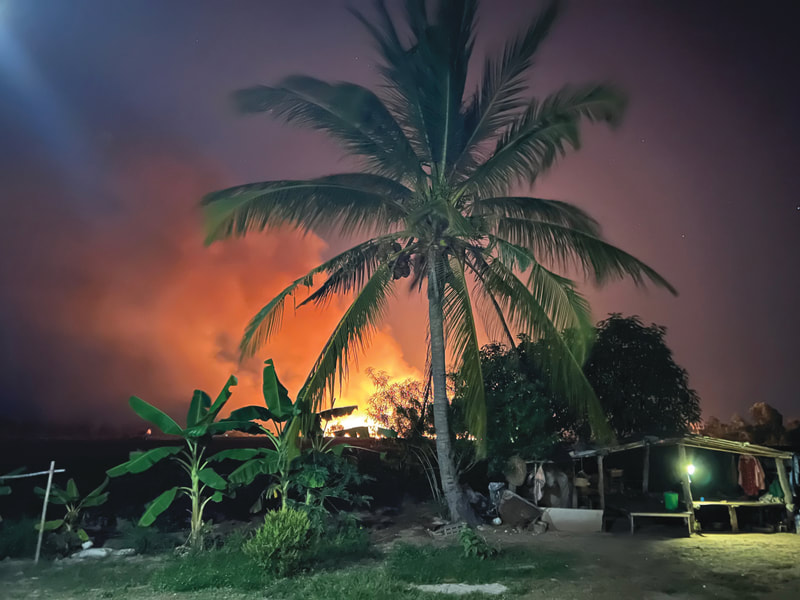
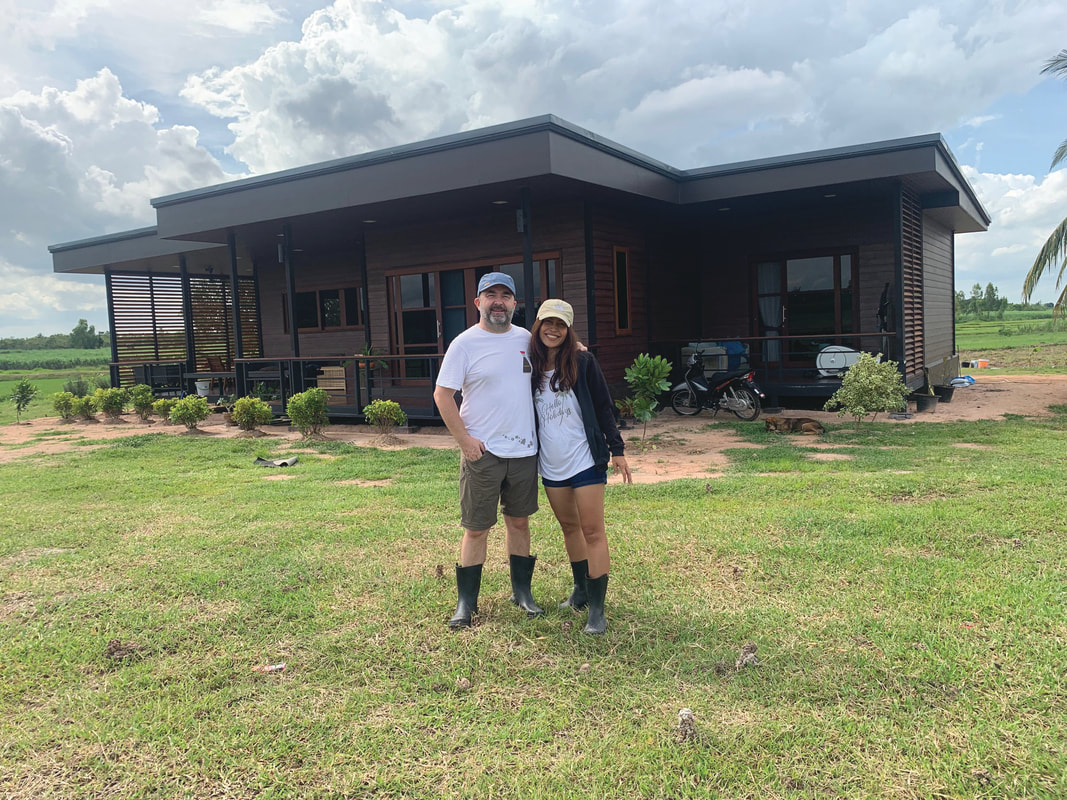
 RSS Feed
RSS Feed
















